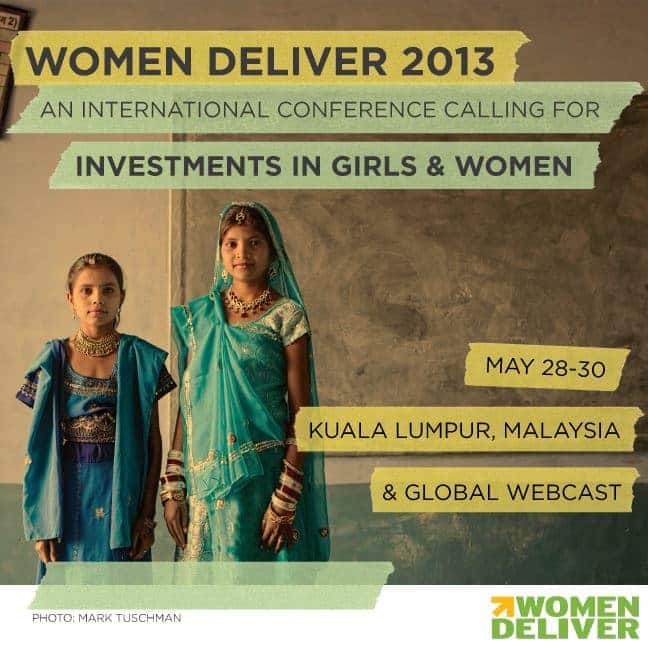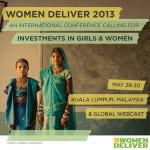Investing in women

 KUALA LUMPUR – Women remain the last to be fed, schooled and given access to healthcare, despite huge gains, former US Secretary of State Hillary Clinton told the 3rd Women Deliver meeting this week.
KUALA LUMPUR – Women remain the last to be fed, schooled and given access to healthcare, despite huge gains, former US Secretary of State Hillary Clinton told the 3rd Women Deliver meeting this week.
Speaking via video, Clinton said the world had to renew its efforts to deliver on the promises “we made to women and girls around the world”.
More than 3 000 delegates including government leaders, royalty, first ladies, policymakers and advocates from over 150 countries are meeting in Malaysia for Women Deliver 2013, a large meeting focused solely on girls’ and women’s health and rights.
Malaysia is hailed internationally for the huge progress it has made in reducing maternal mortality, now sporting one of the lowest maternal mortality ratios in the world. It has reduced maternal mortality from 540 per 100 000 post-independence in the 1960s to a projected 29 per 100 000 by 2015. One of the country’s main investments has been in the education of women and girls.
Jeni Klugman, Director of Gender and Development at the World Bank Group called on the world to “close the deadly gap between what we know and what we do”.
She pointed out that while women now made up 40 percent of the global workforce, female labour force participation had only risen by one percent in the past 30 years.
Also, for every one US dollar a man earns, women earn 12 cent in Bangladesh, 90c in Malawi and 62c in Germany.
Globally, four out of every 10 women have no say over their own healthcare and 800 die every day while giving birth.
Klugman said that while data “greases” the wheels of development, in the 64 countries with the worst maternal outcomes, there was a huge lack of data.
Klugman said that education was the primary vehicle for bolstering girls’ agency. In Kenya, giving girls school uniforms led to a reduction in the likelihood of them dropping out of school or falling pregnant.
However, in India, more than half of girls still marry before their 18th birthday.
Donor agencies and governments are increasingly looking at incentives to improve and increase access to services. In Rwanda, small incentives to providers saw a 23 percent increase in institutional deliveries and huge improvements in outcomes after only two years.
Dr Musimbi Kanyoro, President of the Global Fund for Women, expressed concern that in too many parts of the world small successful pilot programmes “remain academic monuments quoted at conferences, but not taken to scale”.
“We must treat (the inadequate investment in women and girls) as a humanitarian emergency. Justice delayed is justice denied,” a passionate Kanyoro said.
She added that making family planning available everywhere was critical. “We can find Coca-Cola in every village, why not family planning,” she asked.
The meeting ends on Thursday.
Author
Republish this article
This work is licensed under a Creative Commons Attribution-NoDerivatives 4.0 International License.
Unless otherwise noted, you can republish our articles for free under a Creative Commons license. Here’s what you need to know:
You have to credit Health-e News. In the byline, we prefer “Author Name, Publication.” At the top of the text of your story, include a line that reads: “This story was originally published by Health-e News.” You must link the word “Health-e News” to the original URL of the story.
You must include all of the links from our story, including our newsletter sign up link.
If you use canonical metadata, please use the Health-e News URL. For more information about canonical metadata, click here.
You can’t edit our material, except to reflect relative changes in time, location and editorial style. (For example, “yesterday” can be changed to “last week”)
You have no rights to sell, license, syndicate, or otherwise represent yourself as the authorized owner of our material to any third parties. This means that you cannot actively publish or submit our work for syndication to third party platforms or apps like Apple News or Google News. Health-e News understands that publishers cannot fully control when certain third parties automatically summarise or crawl content from publishers’ own sites.
You can’t republish our material wholesale, or automatically; you need to select stories to be republished individually.
If you share republished stories on social media, we’d appreciate being tagged in your posts. You can find us on Twitter @HealthENews, Instagram @healthenews, and Facebook Health-e News Service.
You can grab HTML code for our stories easily. Click on the Creative Commons logo on our stories. You’ll find it with the other share buttons.
If you have any other questions, contact info@health-e.org.za.
Investing in women
by ansothom, Health-e News
May 31, 2013
